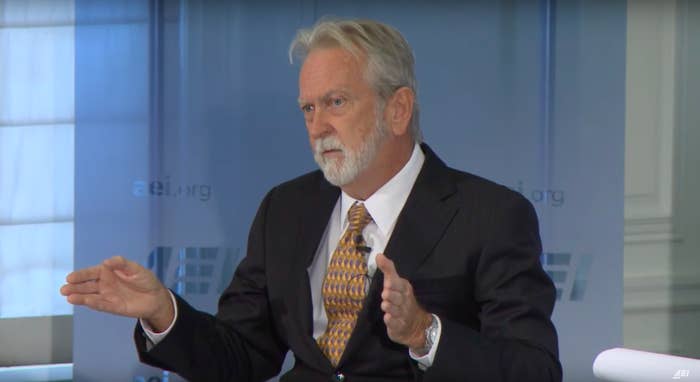
WASHINGTON — The architect of the CIA’s torture program unequivocally defended on Tuesday the use of interrogation techniques like waterboarding and said America needs to consider a return to coercive interrogations, a position favored by many of Trump's hardline defense advisors.
James Mitchell, one of the two government psychologists that devised the CIA’s torture program, made a rare public appearance Tuesday at the American Enterprise Institute, where he continued fueling controversy around the now defunct program and one of the darkest chapters in the agency's history.
“I’m not advocating that we torture people. I’m advocating that we have a civil debate,” Mitchell said.
“Somewhere between waterboarding and worse, and what’s in the Army Field Manual, I think there needs to be some kind of legal coercion,” he said, referring to the congressionally-mandated handbook on humane interrogations.
Mitchell’s comments are a stark reminder that the debate over torture did not end with the CIA’s program, which was shuttered completely by the Obama Administration in 2009. Despite presidential initiatives, congressionally-mandated guidelines and a 6,000-page Senate report concluding the torture program was mismanaged, abused and ineffective, the debate over whether the US should torture has persisted. Top Trump advisors like Michael Flynn and KT McFarland, tapped to be Trump's National Security Adviser and Deputy NSA respectively, have also advocated for aggressive interrogation practices that critics contend are torture.
In the interview at the conservative think tank, Mitchell, who personally waterboarded 9/11 mastermind Khalid Sheikh Mohammed, bemoaned the label “torture” and said he didn’t believe waterboarding qualified.
“The word 'torture' has become like the word 'racist.' It’s been used so many times it loses its meaning,” he said. “If this political correctness continues, we’re going to be standing on a moral high ground looking down into a smoking hole that used to be Los Angeles.”
The program engineered by Mitchell employed the use of tactics like waterboarding, sleep deprivation, stress positions and rectal feeding on detained terror suspects in secret overseas prisons run by the CIA. Agency interrogators are documented to have slammed suspects into walls, chained them from the ceiling and played loud music to keep them from sleeping. Those tactics have been condemned by critics who say they're inhumane and illegal, and the 2014 Senate investigation found the tactics were ultimately ineffective at eliciting intelligence.
“If [waterboarding] was torture, they wouldn’t have had to pass a law in 2015 outlawing it. Because torture’s already illegal,” he said, referring to a congressional statute that limits government interrogators only to techniques listed in the Army Field Manual, which do not include waterboarding. "It sucks, but if it’s done properly...I’m not advocating for waterboarding. I don’t want to be the poster boy for waterboarding. I didn’t like it.”

Mitchell has been lambasted by human rights advocates, intelligence officers and even the American Psychological Association for his role in creating one of the country's most controversial counter-terror operations, the repercussions of which still impact national security initiatives. But Mitchell, who emerged from the shadows to plug his book, defends the techniques as essential to combating terrorism.
"Those people are not part of my life. I don’t care what they think," Mitchell said of a scathing APA report that condemned the collusion of psychologists with the CIA. "It has zero impact on my life and I don’t care.
The AEI appearance comes just weeks before president-elect Donald Trump — who has said he would reinstate waterboarding and “a hell of a lot worse than waterboarding” — takes office, and stacks his top national security positions with amenable voices. Mitchell told reporters after the panel that he had not been approached by the transition team.
Mitchell also said retired Gen. James Mattis, Trump’s pick to lead the Pentagon, was not as opposed to torture and coercive interrogations as press reports have suggested. Trump said previously that Mattis had nudged his opinion on torture, telling the president-elect he gets further with “beer and cigarettes” than waterboarding. Mitchell said those remarks were likely “taken out of context.”
“Would you give up information that would get Americans killed if you were captured by ISIS or al-Qaeda, for a Michelob and a pack of Winstons? I don’t think so. It’s a sad thing to suggest that the general would do that,” Mitchell said.
On Monday, the International Committee of the Red Cross, which polices international interrogations, released a study showing nearly half of Americans think that torture is acceptable, and it was one of only a handful of countries that so enthusiastically supported its use. In contrast, Afghanistan — where the US ran interrogation operations so harsh a detainee died — 83% of people surveyed said torture was wrong.
Mitchell and his partner at the time, Bruce Jessen, were contract psychologists who had never before conducted a real interrogation nor been trained as interrogators before being tasked by the CIA to devise its interrogation program. The two began receiving millions of dollars in government contracts, starting in 2002, to devise the operation.
Mitchell and Jessen famously built the program by reverse engineering the military’s SERE (Survival, Evasion, Resistance and Escape) school tactics. SERE school is used to train military personnel how to resist interrogations should they ever be captured by brutal regimes that do not follow Geneva Convention rules on humane treatment of prisoners of war. It was from SERE that Mitchell and Jessen adapted severe treatments like waterboarding to the CIA.
Both Mitchell and Jessen are currently defendants in a civil suit brought by three former CIA detainees — one of whom died in Afghanistan.
He briefly told press afterward the panel that he believed waterboarding was illegal under a 2015 statute passed by Congress. When a reporter pointed out that waterboarding was not explicitly illegal under any statute, Mitchell became agitated and suggested she didn’t know the law. Facing more questions, Mitchell was rushed out by AEI staffers.
